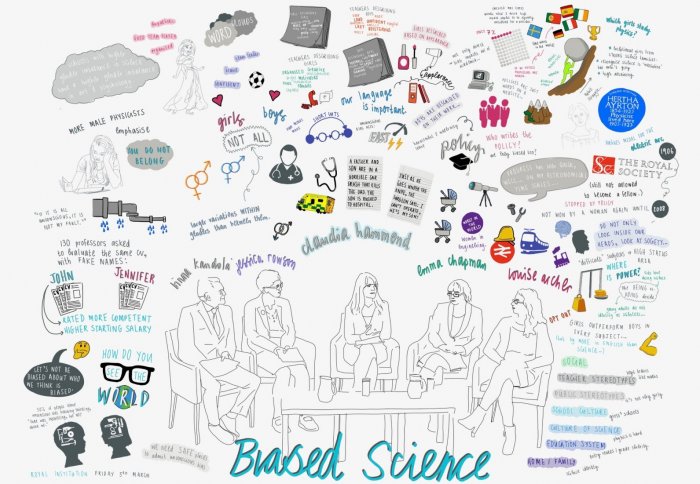"On my astronomical scales, things are changing: women are being let in"
by Jessica Wade

Illustration by Dr Jess Wade
Dr Emma Chapman (Physics) took part in Biased Science a panel discussion at The Royal Institution on 3 March 2017.
Dr Emma Chapman is a Royal Astronomical Society Research Fellow at Imperial College London. Emma is a campaigner for the fair treatment of all scientists, working with universities and the Institute of Physics (IOP) to change the culture of academia. She is honest and vocal about her experiences as a postgraduate student and being a working mother of two; and her insight has effected real change. She is currently working with the IOP to create a guide to dealing with harassment and bullying. In 2014, Emma won the IOP Very Early Career Woman in Physics Award.
On the same stage that Faraday demonstrated electricity in 1856, Emma made the case for diversity in science. Emma was joined by the IOP’s Improving Gender Balance coordinator Jessica Rowson, the Institute of Education’s Louise Archer and psychologist Binna Kandola. The panel discussed unconscious bias (and how effective training was), the status of girls in physics classrooms and how to address gender imbalances within schools.
Rowson has worked with schools across the country, and explained that where there were the lowest numbers of girls in physics classes there was also the lowest numbers of boys in the arts. The IOP had looked at the words girls (make up, pretty, pink) and teachers (organised, motivated, conscientious) associated with being girls. They also looked at the words boys (football, gaming, sport) and teachers (confident, loud, strong) associated with being boys. Perhaps most concerning was the career aspirations of twelve year olds: girls thought appropriate careers for women were models, hairdressers or teachers, whereas boys aimed for firefighters, footballers and engineers. When teachers discussed students, girls were more regularly described based on their appearance, whereas boys were based on their work.
For young people to feel like they could become scientists we need to readdress the balance of power in society, argued social scientist Louise Archer. The careers we value as ‘high status’- professors of physics, senior engineers- have some of the worst representation of women. We cannot just keep plastering over the cracks in our education system, pumping endless sums of money into unevaluated schemes and competitions; we must consider the whole of society.
Emma explained how powerful the language of our teachers and supervisors translates into job references, which has significant implications on the lives of early career researchers. Women are regularly described as empathetic team players, whereas men are bold ‘leaders’. Emma battled with university policy whilst writing up her PhD, attempting to get library access on maternity leave. She recognised that the policy and law within higher education systems is likely written by people with large amounts of unconscious bias themselves. The sterile rules, often out-of-date pages on a website, dictate the whole environment of minorities in academia.
Even by the 1940s minorities were not recognised for their contributions to technology- the women coders at NASA were known simply as “computers”.
– Dr Emma Chapman
Research Fellow
Emma came armed with examples of just how bad things can be. Her first example, by Milkman et in 2014, found that discrimination started even before you began your PhD. Surveying of 200 US academic institutions, Milkman found you were much more likely to receive a response to an email from a professor if you were white and male. If you are from a minority group, the early stages of your career are an uphill struggle. A 1997 Swedish study found that to be selected as post docs over their males counterparts, women had to publish 3 more ‘high impact’ science papers, in the likes of Nature or Science. Hertha Ayrton won the prestigious Royal Society Hughes Medal for her discovery of the electric arc in 1906. Despite significant momentum behind her being elected to become a fellow of the Royal Society, it was decided that this was not possible- she was after all a married woman. Even by the 1940s, Emma pointed out, minorities were not recognised for their contributions to technology- the women coders at NASA were known simply as “computers”. The next woman to win the Royal Society’s Hughes medal was over a hundred years later - our own Professor Michelle Dougherty in 2008.
What became apparent over the evening was that this is not just a man vs. woman issue: gender biases impact everyone in the room, and unless we can openly admit to them in a ‘safe place’, nothing will change. No individual or institution wants to be the first to announce they have a problem, but without data, nothing will change. Psychologist Binna Kandola spoke honestly about unconscious bias training, sure, it is important, but a third of attendees leave thinking “interesting, but it doesn’t apply to me”. He wants to know why we need to make the case for women in business at all. “Why do women have to provide an explanation for wanting to sit at the table, whereas men just sit down?”.
“Biased Science” was a painful and eye-opening discussion between some of the most clued-up minds in the country. Whilst progress is slow; I am optimistic for women in physics: with trailblazers like Emma Chapman in our department, we are in good hands.
Article text (excluding photos or graphics) © Imperial College London.
Photos and graphics subject to third party copyright used with permission or © Imperial College London.
Reporter
Jessica Wade
Department of Materials